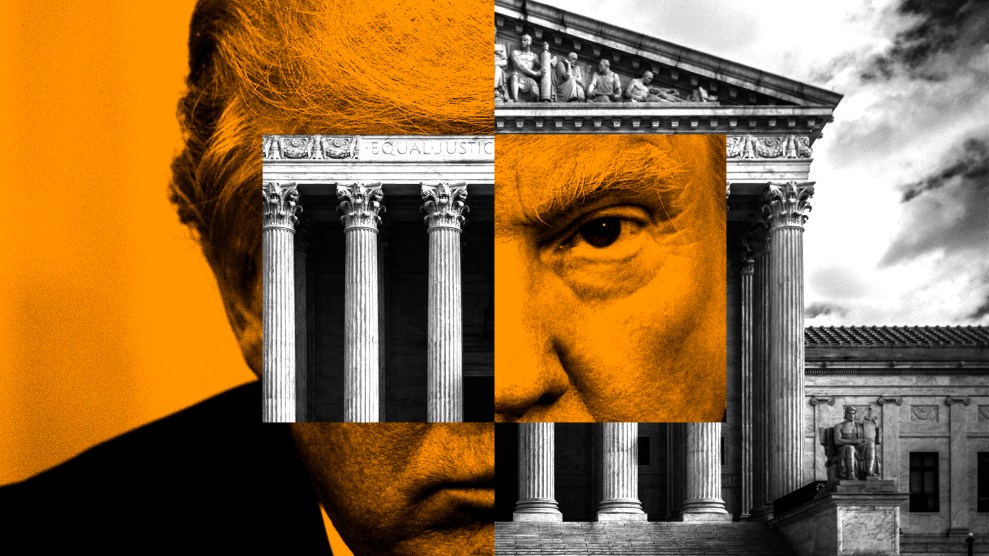
Mother Jones; Olivier Douliery/ABACA/Sipa/AP; Unsplash
The Supreme Court on Thursday heard oral arguments in a case brought by voters in Colorado seeking to bounce former President Donald Trump from the state ballot on the grounds that he engaged in insurrection. The justices—including most of the court’s liberals—seemed generally hostile to Colorado voters’ arguments and largely unwilling to permit the Colorado Supreme Court to deprive Americans the chance to elect the candidate of their choosing. However, one justice did provide a tantalizing hint as to how the court might rule in another Trump case that is likely to come before it in the coming weeks.
During the oral arguments over the Colorado ballot issue—which focused specifically on the application of Section 3 of the 14th Amendment, which generally bars insurrectionists from returning to public office—Justice Brett Kavanaugh suggested that there was another, less complicated way to keep someone with Trump’s record off the ballot. “If the concern you have is that insurrectionists should not be able to hold federal office,” Kavanaugh said, “there is a tool to ensure that that does not happen, namely, federal prosecution of insurrectionists. And if convicted, Congress made clear you are automatically barred from holding a federal office.”
In August, in a case brought by special counsel Jack Smith, a federal grand jury indicted Trump on four charges related to the events of January 6. In response, Trump has claimed that, because he was president at the time, he is immune to criminal prosecution. On Tuesday, the DC Circuit Court of Appeals ruled that Trump is absolutely not immune from criminal prosecution for attempting to overturn the results of the 2020 election. Trump has until February 12 to ask the Supreme Court to hear the case if he wants to try to halt his criminal trial from moving forward.
Smith has not charged Trump with insurrection, but Kavanaugh—a Trump appointee who often represents the court’s swing vote—seemed sympathetic to the idea that a former president could indeed be prosecuted for crimes he committed in office, including insurrection.
“That sound you hear is Jack Smith’s team convening a grand jury to indict Trump on federal insurrection charges,” tweeted legal analyst Mike Sacks upon hearing Kavanaugh’s comment.
Even if Smith has no plans to do that, Kavanaugh’s words may augur well for the January 6-related charges Smith has filed against the ex-president.
The comment was a brief blip during a 90-minute argument over whether Colorado and other states have the power to remove a federal candidate from a state ballot. The voters who brought the case in a Colorado court argued that Trump’s involvement in the events of January 6 rendered him ineligible for the presidency under Section 3 of the 14th Amendment, which disqualifies insurrectionists from serving as an officer of the United States if they previously swore an oath to support the Constitution.
After a five-day trial, the Colorado court found that Trump had engaged in an insurrection but that the provision didn’t apply to the president. The Colorado Supreme Court overturned the ruling and ordered Trump barred from the state ballot. Trump appealed, and the US Supreme Court took up the case as the election season was well underway.
The arguments seemed to go well for the Trump team from the start. Pointing to the history of the 14th Amendment—which was created after the Civil War to, among other things, punish states for restricting citizens’ right to vote—Chief Justice John Roberts said, “The whole point of 14th Amendment was to restrict state power. Wouldn’t it be the last place you’d look, to the states, to enforce the presidential election process?”
A very testy Justice Samuel Alito grilled Jason Murray, the 38-year-old lawyer representing the Colorado voters who brought the case, about who would decide on the standard of proof for states deciding what qualified as insurrection, suggesting that every state might end up adopting their own rules. “Different states will disqualify different candidates,” Alito said. “I’m not getting a lot of help from you about how this would not be an unmanageable situation.”
Even liberal justices did not seem persuaded by Murray’s arguments that the states were free to make rules for federal candidates on their own ballots. “What’s a state doing deciding who other states’ citizens get to vote for for president?” Justice Elena Kagan asked Murray.
Murray, who had once clerked for Kagan, suggested that every state could decide whom to allow on the ballot and could even permit insurrectionists to run—a reply that didn’t seem to allay any of the justices’ concerns that they would unleash sheer chaos into the election system if they upheld the Colorado Supreme Court.
Surprisingly, very little of the arguments focused on whether, in fact, Trump’s actions on January 6 qualified as insurrection. Justice Ketanji Brown Jackson finally returned to the issue that brought this case to the court in the first place, challenging Trump’s lawyer Jonathan Mitchell when he said that “there needs to be an organized, concerted effort to overthrow the government of the United States through violence” for an event to qualify as an insurrection.
“So your point is that a chaotic effort to overthrow the government is not an insurrection?” replied the seemingly incredulous Jackson.
“This was a riot,” Mitchell replied. “It was not an insurrection. The events were shameful, criminal, violent, all of those things, but it did not qualify as insurrection.”
















